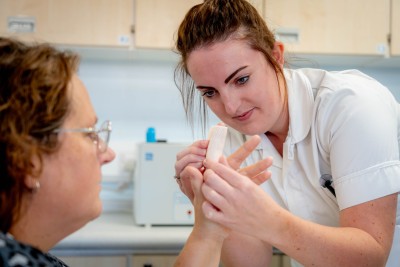
Our Occupational Therapists are all registered with the Health Professions Council and receive ongoing support and development to ensure that we offer a safe, effective and high-quality service.
Hand therapy is the assessment, treatment and rehabilitation of hand conditions, injuries and other upper limb disorders which affect hand function.
At Chesterfield Royal Hospital, you can expect our hand therapists to provide a comprehensive assessment and an individualised and tailored rehabilitation program, which may incorporate various therapeutic treatment techniques.
- Some of these interventions may include;
Preventative and ergonomic advice. - Wound care and scar management.
- Oedema management.
- Exercise and strengthening programs.
- Sensory assessment and re-education.
- Splinting/ bracing.
- Functional skills retraining.
- Exploring aids and adaptions.
We also run a hand therapy group twice a week for patients who require more intensive input and support.
Hand therapy also has a crucial role in the recovery from hand and wrist surgery. The hand therapy service is integrated into the orthopaedic hand surgery and nursing team, and our hand therapists attend weekly clinics with the hand consultants.
Some of the common procedures seen in hand therapy following surgery include;
- Fasciectomy for Dupuytrens Disease
- Trapeziectomy
- Carpal and Cubital Tunnel Decompression
- Distal Volar Radius (DVR) plating of wrist fractures
- Joint fusions
- Joint replacements
- Tendon repair
Rheumatic conditions can cause many troublesome symptoms such as pain and fatigue. This can make everyday tasks feel overwhelming and exhausting.
It is also not uncommon that rheumatic conditions cause pain and problems in the hands. Hands are essential for everyday functioning; even simple tasks can feel impossible when our hands are not working as they usually do.
The occupational therapist based in rheumatology has a key interest in hand therapy but will also be interested in what activities you are finding difficult due to your condition. Their focus is on helping patients manage their condition and regain independence and function. Many treatment options may be used to achieve this such as:
- Hand splints to manage hand discomfort or deformities. This is so patients can maintain hand function
- Hand exercises to maintain hand function
- Fatigue/pain/sleep management advice
- Prescribe or advise on equipment that can make tasks easier
- Joint protection advice
- Setting goals for rehabilitation
- Educating patients on their condition and how to manage this
This is a multidisciplinary team to help you return to function following your post-COVID syndrome. You may be referred to the rehab teams following your assessment in the post-COVID assessment service.
The rehab teams can help you manage symptoms such as fatigue, breathlessness, and cognitive changes, as well as help support your return to work, or other roles in your day-to-day life.
Professions that sit in the rehab teams:
Occupational Therapy
Occupational Therapists (OT) look at functional activities including routines, work, life roles, personal and domestic activity management and how your current condition impacts these areas. This may involve physical, cognitive, social and psychological aspects. OTs can support fatigue management, work rehabilitation, appropriate adjustments to lifestyle, and environment and support you and your family to optimise your abilities whilst recovering from the effects of long covid.
Physiotherapy
The physiotherapists in the hubs can help to explore your physical problems post covid i.e. breathlessness and exercise tolerance; work with you to develop a breathing exercise program; start a reconditioning program with you and signpost to other physiotherapy teams like musculoskeletal physiotherapy as required.
Psychology
In the hubs, we have a mix of psychologists and psychology assistants. The psychology team work with the other professionals in the team to support engagement in rehab, support coming to terms with post-COVID syndrome and support managing any cognitive problems. The psychology team may not necessarily see every patient directly, however, they work closely with the team to support your needs.
Therapy Practitioners
Work alongside the therapy teams to support your rehabilitation and fatigue management.